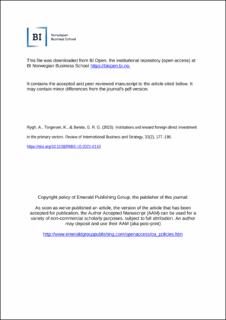| dc.description.abstract | Abstract Purpose Well-functioning institutions are repeatedly claimed to attract foreign direct investment (FDI) by reducing the costs and uncertainty of economic activity. Nonetheless, it has been argued that institutions may matter less for FDI in the primary sector. This study aims to theoretically and empirically investigate the role of institutions for attracting FDI in agricultural and in extractive activities. Design/methodology/approach This study uses worldwide country and sector-level data on inward FDI for the period 1996–2007. The key independent variables, property rights protection, corruption and democracy, are measured using World Bank Governance Indicators and Polity IV as data sources. Fixed effect panel regression, Tobit regression and generalized method of moments are used for data analysis. Findings The authors corroborate the importance of institutions for aggregate FDI. Disaggregating by primary subsector, the authors find that agricultural FDI, like aggregate FDI, is attracted by institutional features such as rule of law and property rights protection and democracy, whereas extractive FDI is not. The authors also find some evidence that corruption deters FDI in both primary subsectors. Originality/value The authors take a first step toward linking the largely empirical institutions-FDI literature more closely with the economics-based theoretical discussions of FDI risk grounded on a property rights approach, to discuss issues such as effective control rights over investments, which may vary between sectors. The authors also explore a novel idea that extractive activities may be less sensitive to institutions because the time horizon is limited by the depletion of the resource, resulting in an inherently relatively short-term commitment to a host-country location. | en_US |
